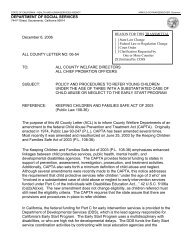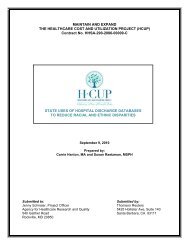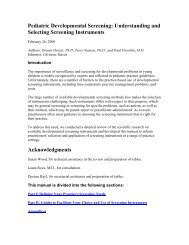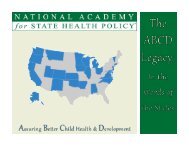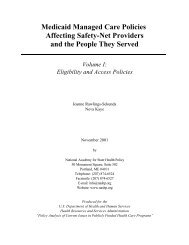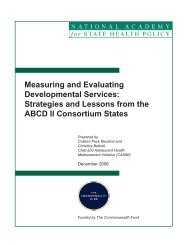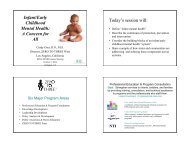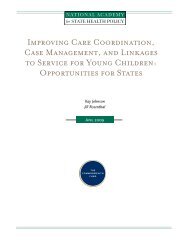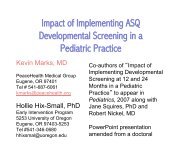Developing Federally Qualified Health Centers into Community ...
Developing Federally Qualified Health Centers into Community ...
Developing Federally Qualified Health Centers into Community ...
Create successful ePaper yourself
Turn your PDF publications into a flip-book with our unique Google optimized e-Paper software.
are many federal, state, and institutional barriers that make it difficult for FQHCs to<br />
assume broader roles in their communities by forming collaborative networks with<br />
private practices. These include:<br />
• large differences in capabilities from one FQHC to the next;<br />
• lack of incentives for private practices to participate in an FQHC-based network;<br />
• need for the involvement of multiple payers;<br />
• lack of information-sharing between providers;<br />
• limited capacity to collect quality data for an entire episode of care;<br />
• <strong>Centers</strong> for Medicare and Medicaid Services (CMS) productivity requirements for<br />
FQHCs; and<br />
• visit-based fee schedules that discourage innovation.<br />
Federal health reform offers opportunities to overcome such barriers. The<br />
Affordable Care Act creates opportunities for states and FQHCs to pilot community<br />
networks, including:<br />
• the Center for Medicare and Medicaid Innovation;<br />
• enhanced funding for FQHCs;<br />
• funding for community health teams;<br />
• a new Medicaid state plan option for health homes for those with chronic conditions;<br />
and<br />
• primary care extension programs.<br />
Conclusion<br />
The creation of community-based networks to provide care management and greater<br />
access to health care services may enable states to hold down Medicaid costs while<br />
providing better care for beneficiaries. With the expansion of Medicaid through the<br />
Affordable Care Act, already-stretched primary care practices will need to take on<br />
additional Medicaid patients. Helping practices function more efficiently as medical<br />
homes—particularly for patients with chronic illnesses—can help improve access to<br />
high-quality care and control costs. In order for practices to function as medical homes,<br />
they will need resources to ensure the delivery of timely, coordinated, and comprehensive<br />
primary care. Many FQHCs have the infrastructure and expertise to help practices meet<br />
medical home requirements and may be ready partners for states to develop as<br />
community networks.<br />
x



